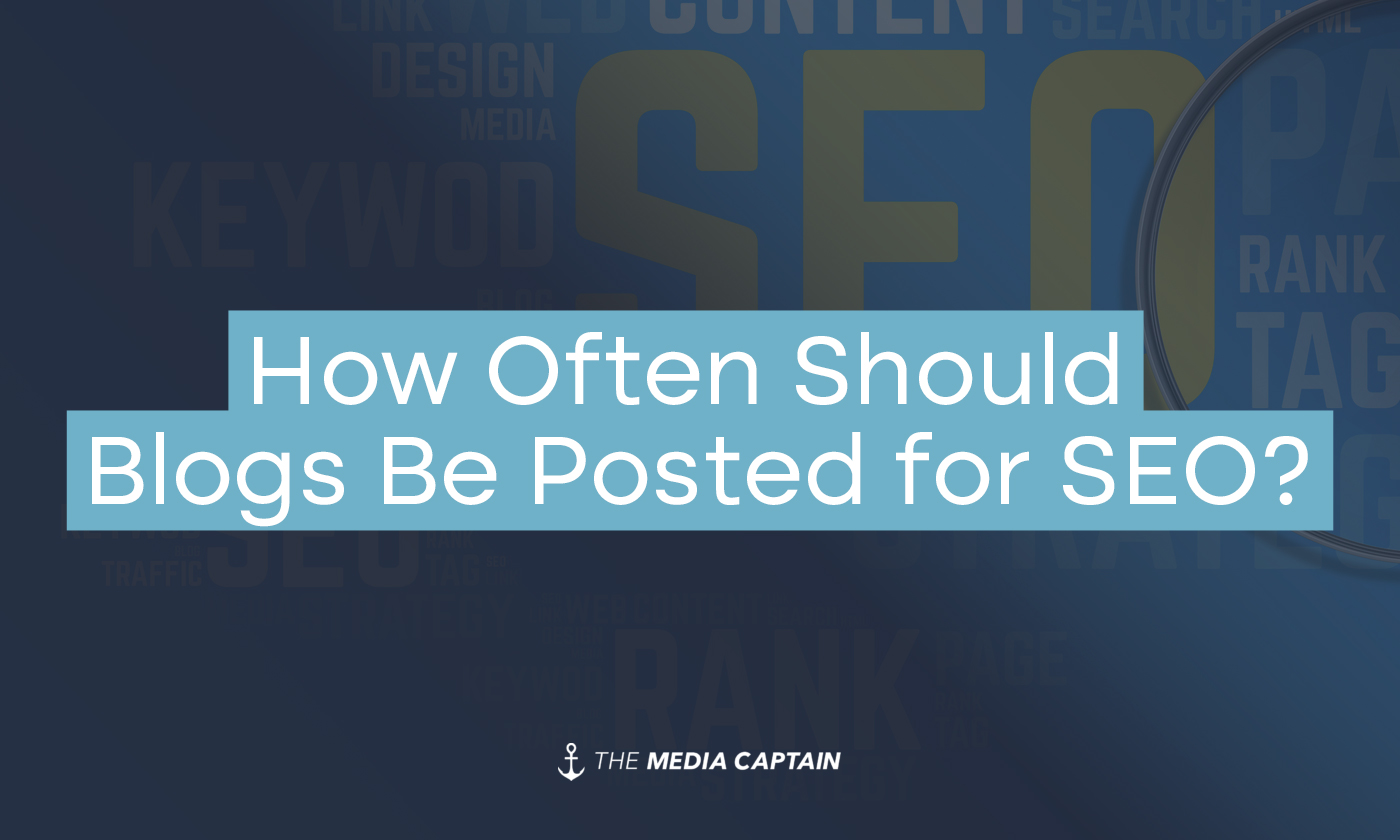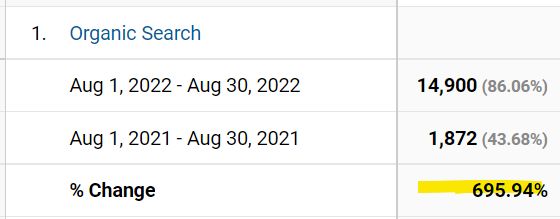How Many Blogs Per Month Should You Create?
- 2-to-4 blog posts per month is a great starting point on how often you should post blogs on your site.
- This could vary depending on your industry and the performance of your existing blogs.
- There are many ways to measure success with your monthly blogs to ensure your blog is ROI positive (listed below).
- The common misconception is that the more blogs you post, the better off you will be for SEO, as Google loves “fresh content.” This couldn’t be further from the truth. Google would rather see one high-quality blog post versus three mediocre ones. Quality over quantity.
- With the advancement of AI, churning out many blog posts is a fad that may reap short-term benefits but will have long-term consequences.
- Enhancing prior blogs before selecting new blog topics can be more advantageous.
- Blogs can be an excellent way for your business to generate leads for your website for in-depth topics.
Table of Contents
My Experience with Blogs
I started my marketing agency, The Media Captain, back in 2010. It wasn’t until 2020, a decade later, that my blog became a sales resource for our agency, helping us generate constant leads while growing our book of business.
One of the biggest misconceptions about blogging is that Google loves fresh content. The more frequently you post, the more your website will be rewarded from an SEO perspective.
I had to learn the hard way this wasn’t the case. My website was negatively penalized by Google’s May 2020 core algorithm update. Most of my blogs were thin in content, meaning they had a low word count with little substance. The topics were also not always relevant to our core suite of services.
When Google looked at my website, which had approximately 200 pages, 150 of those pages were blogs, which were low quality. Because of this, my keyword rankings dropped across the board. I had to reevaluate my blog strategy to regain Google’s good graces. I’ve been working on this ever since.
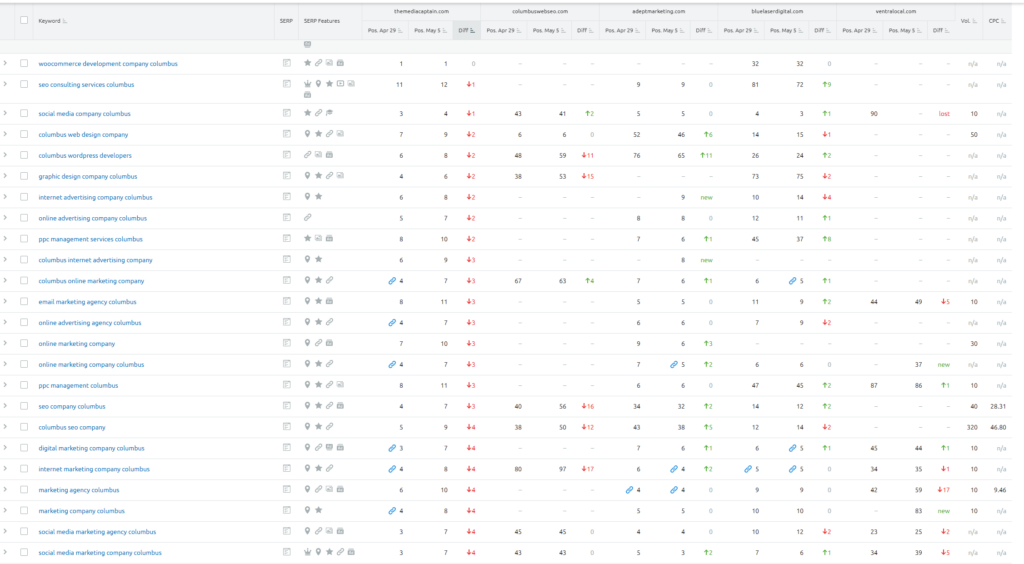
Measuring Your Blog Success
You should determine goals and objectives before determining how many blog posts you should write monthly. The last thing you want to do is invest the time and resources into writing many blogs without reaping any benefits.
So many businesses aimlessly write mediocre blog content that doesn’t generate a positive ROI for their business and could do more harm than good. By listing out your goals and objectives, there is more clarity with your blog strategy.
Our agency’s blog aims to provide expert written content that answers digital marketing questions for current and prospective clients. In doing this, we will generate more businesses from people searching on Google for marketing-related queries. At the same time, we have a resource to guide current and prospective clients when they have specific marketing-related questions. Our blog is also a great resource for our sales team and marketing strategists.
ROI Checklist For Your Blog
Below is the checklist our agency utilizes when auditing blogs to determine the ROI. Feel free to use this to gauge your overall blog success. As sub-bullets, I added more context based on our blogging experience.
Strategic Blog Topics
- Can you share your article with a current or prospective client?
- Would someone share your article with a colleague, friend, or family member?
- It’s important to stay on-topic based on your area of expertise.
- I had numerous articles about sports media and TV ratings when Google’s core algorithm update negatively impacted my site. This was off-topic to what we offer our clients.
Keyword Rankings
- Are your blog posts ranking well on Google?
- Are you leveraging a tool like SEMRush to monitor keyword rankings?
- Whenever we create a new blog, we add the respective keywords into SEMRush to measure success.
- The goal should be to rank on the first page of Google!
- When you pick more niche topics, you will have a better chance of ranking well!
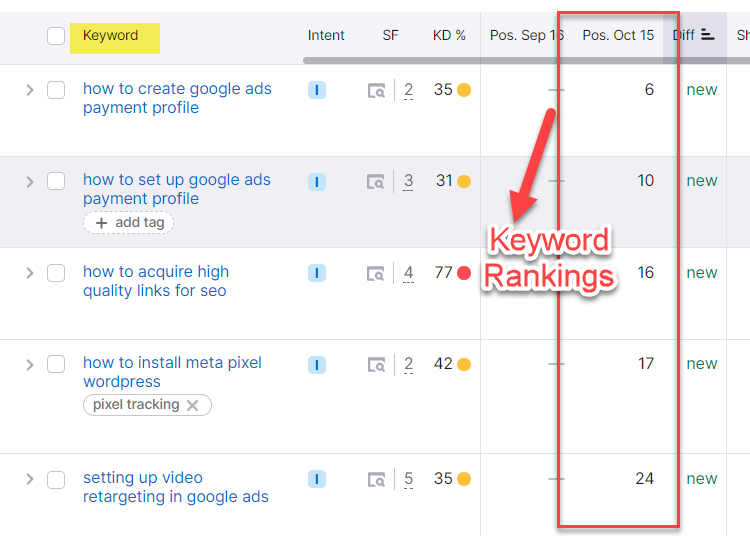
Website Traffic
- Is your blog generating quality organic traffic?
- Are you utilizing your blog to drive traffic from email marketing and social media?
- For The Media Captain, once we started blogging more consistently, we increased our organic traffic by over 695% from 2022 vs. 2021, when we hadn’t blogged. Once you start blogging more frequently and effectively, there’s so much potential!
Backlinks
- Are other websites linking back to your website?
- One of the best indicators of blogging success is if other sites find your content so valuable that they link back to it. This can increase the authority of your entire site!
- We wrote a blog about Google My Business statistics. This blog generated over 287 backlinks to our site! This is more links than I could have ever earned from manual outreach or any other type of backlink building. The screenshot below from SEMRush shows the number of domains and links going to this one page.
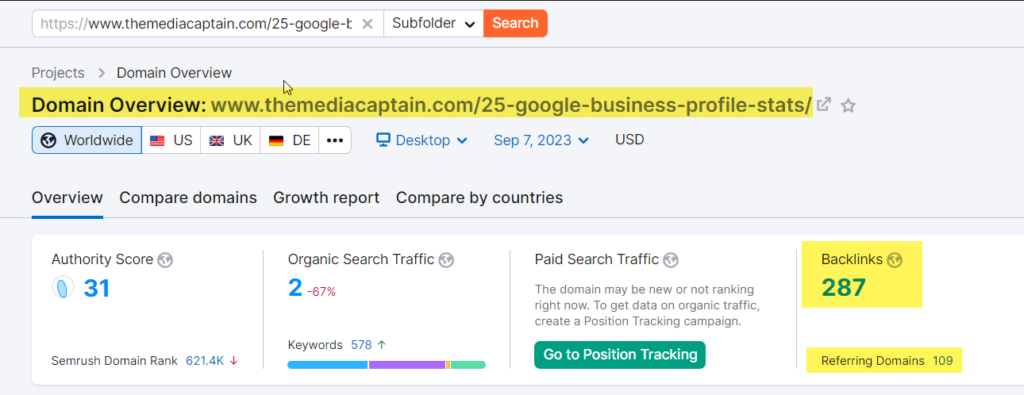 Positive ROI
Positive ROI
- Are your blogs generating leads, sales, or revenue from monetizing? While this isn’t always the objective, there normally needs to be some ROI incentive in business. Tracking conversions within Google Analytics is recommended to see how many people converted from your blog.
Related Blog: Should you change the original publish date when modifying your blog?
Start with 2-4 Blogs Per Month
- 2-4 blog posts per month is a great starting point regarding blogging frequency, as long as the content abides by the quality checklist referenced above. Over the course of the year, this would equate to 24-48 blog posts.
- Even if you blog once per month, this can still make a big difference! You are still in a consistent pattern, which is crucial for blogging.
- Some people enjoy writing and are better at it than others. If you have enough time and can scale beyond four blogs per month, this could lead to more organic traffic and leads.
- Even if you blog once per month, this can still make a big difference! You are still in a consistent pattern, which is crucial for blogging.
- To write high-quality blogs, you should give yourself at least four hours to complete each blog. This may seem like a long time, but if you’re focused on creating high quality, expert written content, this should be the baseline.
- If you have a team of experts, great use of their time is having them write blog content based on their expertise.
- For our agency, until recently, only my business partner and I blogged. This was exhausting as we tried to scale beyond 4-blogs per month based on a demanding work schedule. We decided to start leveraging our team of experts to write blog content. I’m not an expert on installing Facebook’s tracking pixel, but Rachelle on our team is. This allowed us to scale our content creation while hitting on more topics we would have never written about.
- Mapping out a 12-month blog strategy is a great exercise to plan and hold yourself accountable.
- What are the topics?
- Who is the writer?
- What is the deadline?
- What are the keywords you’ll target and track for each blog?
- What are other blogs you can internally link to?
- How do you plan on promoting this blog?
- Your industry could dictate how many blogs per month you create.
- If you owned a sports media website covering the New York Giants, you would need to create blogs/articles on practically a daily basis to compete with others in the media industry.
- While 2-4 blogs are a good starting point, this will be completely predicated based on your business, goals, and objectives.
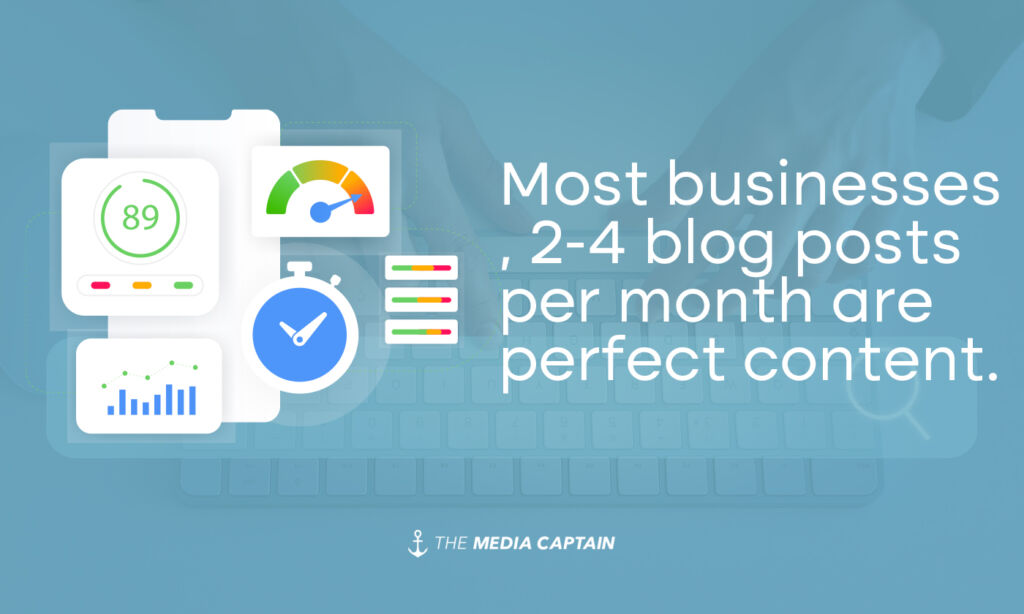
Scaling Blog Frequency with AI
I’ve been vocal about my opinion on those who are over reliant on AI for content creation. In my opinion, those who invest in creating high-quality, original; content will be rewarded while those who use AI content will have a more difficult time ranking and converting.
Despite Google stating that AI is NOT against Google Search’s guidelines, they advise on the following:
“Google aims to reward original, high-quality content that demonstrates qualities of what we call E-E-A-T: expertise, experience, authoritativeness, and trustworthiness.”
If you are copying and pasting AI-written content onto your website, nothing is unique about this. Within this article, I’m providing examples of our blog strategy, metrics, and other insights, which AI can’t do.
I would not advise writing articles at scale using AI. This goes back to my earlier point of too many people believing the amount of articles produced will help them rank. It’s not about quantity; it’s about quality.
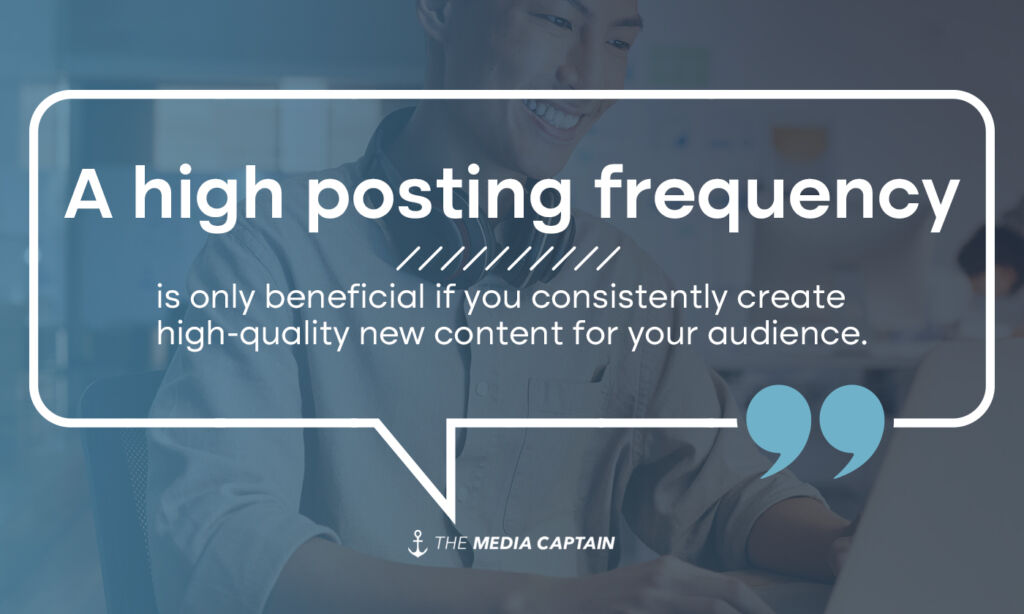
Enhance Content Before Writing New Content
- Everyone is eager to write new content when it comes to blogging.
- Instead of writing new content, the first priority should be enhancing previously written content.
- Often, blogs that aren’t ranking well have quality issues that can be addressed to improve performance.
- When performing a content audit, you will also find blogs that are no longer relevant blogs that can be deleted or redirected.
When Google negatively impacted our website due to low-quality content, we returned to prior blogs and enhanced, deleted, or redirected content.
In Closing
- There is no perfect answer for how often you should blog; every business is different.
- Getting into a consistent routine where you blog at least once a month will lay a good foundation.
- 2-4 blog posts are a good starting point that we recommend for many clients, but this can vary depending on your industry, time, and resources.
- Before creating new content, we recommend enhancing prior content.
- Don’t get lured into scaling your blog operations with AI. Google values high-quality, original content.
- Before blogging, plan your strategy and list your goals and objectives. This will provide you with more clarity and help justify your return on investment with blogging.
- Track your blogging performance. Just because you hire someone to blog for your company doesn’t mean they are succeeding. They can cause more harm than good. Follow our checklist to ensure your blog is performing well.
If you need help with your blog strategy or improving your SEO, contact The Media Captain for a free consultation!


